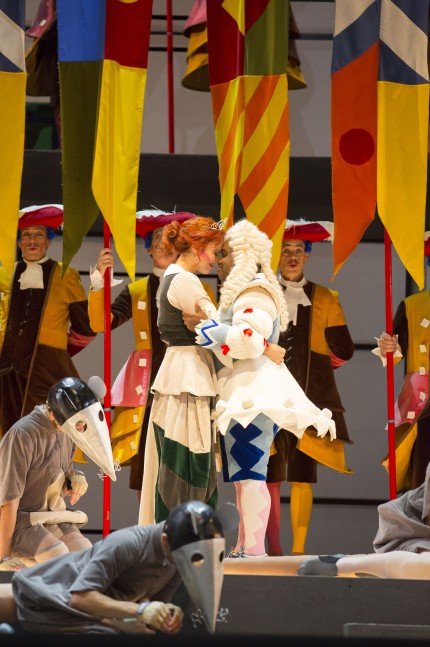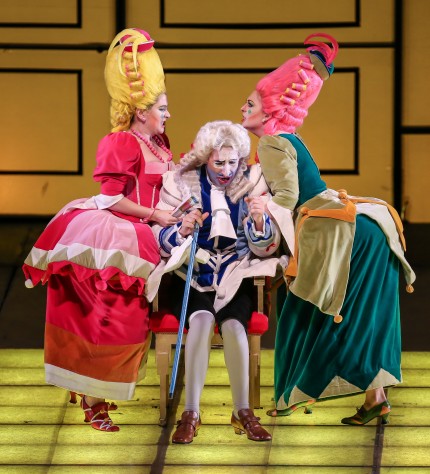With a superb cast and charming production, Lyric hits several high notes in delightful “Cenerentola”

After the numbingly tasteless new production of Le nozze di Figaro that opened Lyric Opera’s season, the company really needed a lift to get this young season back on track.
Fortunately, they got that and more with Rossini’s La Cenerentola, which opened Sunday in a matinee performance at the Civic Opera House. With the charismatic Isabel Leonard in the title role, a gifted tenor making his Chicago debut, and a clever, charming production, Lyric’s Cinderella proved delightful from start to finish.
The Houston-Cardiff-Chicago artistic shuttle provokes raised eyebrows at times with Lyric CEO and general director Anthony Freud often drawing on shows he originated at his two previous companies. But no complaints about this colorful staging by the Spanish theatrical team of director Joan Font and designer Joan Guillen.
Guillen’s mutable unit set morphs from Cinderella’s dark fireplace to a towering entrance door to the prince’s palace. Guillen’s bright costumes and clever puppetry evoke the storybook settings with a wry postmodern eye without sacrificing an essential innocence. It was hard even for a curmudgeonly critic to resist the pantomime mice who are Cinderella’s friends as they respond to every twist and turn of the story with tilted heads, even lending a hand with the scenery and operating the thunder and wind machines in Act 2. (Unlike the crass Figaro, you can take your children to this family-friendly show, and there were many in the audience Sunday afternoon.)
At times the production flirts with high camp, as with the evil stepsisters’ Day-Glo pink and yellow wigs. And rather than Cinderella’s transformation into bewitching young woman, she appears with a stiff white dress, pearls, white bouffant and Dame Edna glasses, which make her look less like the beautiful princess-to-be and more like an eccentric middle-aged aunt.
Yet those staging lapses are few, and director Font’s artful coda at the curtain ended an afternoon of high farce and comic high-jinx on a touching bittersweet note.
Most importantly, unlike the intrusive Figaro staging, this Cinderella keeps Rossini’s music front and center throughout the three-hour-plus performance. Having Andrew Davis at the helm insured polish and clean articulation from orchestra and cast alike. The precision and vibrancy of the playing and singing consistently made Rossini’s witty music sparkle.
As Angelina, the radiant Isabel Leonard brought a believable human quality to the abused, put-upon girl amid the surrounding farce. She was affecting in her honest love for the prince Don Ramiro–who masquerades as his own valet—and Cinderella’s genuine willingness to forgive her insufferable stepsisters and mendacious father. If her graceful mezzo-soprano failed to project clearly in the opera’s opening minutes, Leonard soon found her vocal footing, and sang touchingly in Cinderella’s melancholy moments while throwing off Rossini’s high-flying roulades and coloratura runs with pinpoint accuracy and agility.
One could hardly wish for a better vehicle for Lawrence Brownlee to make his belated Chicago debut. As the prince, the American tenor handled the comedy and romance with equal assurance. Vocally, Brownlee demonstrated why he is arguably today’s leading Rossini tenor, bringing a poised, bel canto elegance to his arias and conquering the vocal hurdles of the virtuosic music with fearless elan. Brownlee was dazzling in Ramiro’s Act 2 showpiece “Si, ritrovarla io giuro,” throwing off the high C’s and D’s with supreme bravura, technical security and panache.
Alessandro Corbelli’s bass had thinned out with the years. If he can’t quite toss off the buffo patter with the speed and rich tone of years past, the veteran Italian singer still brought fine vitality and sure comic timing to the inaptly named Don Magnifico, Cinderella’s odious father.

As the aptly named Dandini, the valet who masquerades as his royal employer, Vito Priante was an absolute hoot. Making a showy Lyric debut, the Italian baritone brought a flexible and firmly placed baritone to the comic role, while nicely differentiating his foppish persona as the disguised prince from his regular-guy valet.
Rossini dispensed with the fairy godmother in his opera, instead assigning the role of Cinderella’s magical enabler to the prince’s tutor Alidoro. Christian Van Horn was wonderful as a towering Nostradamus-like wizard, wielding his warm, sonorous bass with striking flexibility.
As Cinderella’s nasty stepsisters, soprano Diana Newman (Clorinda) and mezzo Annie Rosen (Tisbe) knocked the ball out of the park in their Lyric Opera debuts. The Ryan Opera Center first-year artists were wonderfully detestable and showed the theatrical ease and seasoned maturity of veteran performers. Both women sang superbly in their duos and ensembles and brought consistent vitality to the evil siblings’ comic shenanigans, not least the interplay with their Kardashian-esque bustles.
Under Michael Black, the men of the Lyric Opera Chorus sang with refinement and strength as the prince’s soldiers and retinue.
This is one of Lyric Opera’s strongest comedy productions in recent years. Snap up those tickets and bring the kids.
La Cenerentola runs through October 30. lyricopera.org; 312-827-5600.
Posted in Uncategorized





Posted Oct 13, 2015 at 10:11 am by Jack Rogers
Who needed the mice? And the WHOLE OPERA could have used some body motion in sync with the music. If it was a dream (???) it was a bad dream.
Posted Oct 27, 2015 at 10:37 pm by Peter-D-G
We attended the Monday evening (Oct 26) performance and really enjoyed the music and the fun. But if you criticize the Figaro for its slapstick and garish costumes, how can you praise the Cenerentola? It was much worse. Of course the Figaro was just tasteless and off key relative to the story. In Cenerentola all the fun was a good fit. But all those mouse finger gestures – mimicked at the end by the whole cast – and the bananas bit up there in the final chorus – way too much distraction.
I was somewhat disappointed by Isabel Leonard’s voice. She was strong where she was the open lead sound, but in the ensembles and with a fuller orchestra her part was mostly lost. Maybe she had a bad night.
Question: in the second act about a minute before the end of the duet “un segreto d’importanza” Don Magnifico’s line is “non partiro” [I’m not leaving]. It clearly sounds like “nobody home” and it’s repeated several times a half minute later. Anybody know that that’s all about?